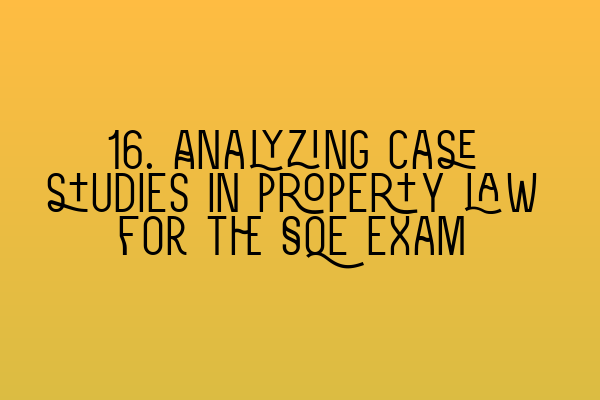16. Analyzing Case Studies in Property Law for the SQE Exam
As the SQE exams approach, it is crucial to thoroughly prepare for the Property Law and Land Law section. This portion of the exam tests your understanding of various concepts and principles, and one of the best ways to prepare is by analyzing case studies. In this blog post, we will discuss the importance of analyzing case studies and provide some tips to help you succeed in this area of the exam.
Why Analyzing Case Studies is Important
Analyzing case studies is an essential part of preparing for the SQE exam. It allows you to apply your knowledge of Property Law and Land Law to real-life scenarios, helping you understand how the law works in practice. By analyzing case studies, you can develop a deeper understanding of the legal principles involved and practice reasoning through complex legal issues.
Case studies are also an effective way to improve your problem-solving skills. They require you to identify the relevant legal principles, apply them to the facts at hand, and reach a reasoned conclusion. This process mirrors what you will encounter in real-world legal practice, making it an invaluable skill to develop.
Tips for Analyzing Case Studies in Property Law
1. Read the question carefully: Make sure you understand what the case study is asking. Pay attention to the specific legal issues involved, as well as any relevant facts or details provided.
2. Identify the legal principles: Once you have a clear understanding of the question, identify the legal principles that are relevant to the case. Make a list or outline of these principles to serve as a reference as you analyze the case study.
3. Apply the legal principles: Analyze the facts of the case and apply the relevant legal principles. For each issue or question, explain how the law applies and support your analysis with references to relevant cases or statutes.
4. Consider alternative arguments: In Property Law, there are often multiple ways to interpret the law and reach a conclusion. Consider alternative arguments or perspectives and discuss their strengths and weaknesses. This demonstrates your ability to think critically and evaluate different legal positions.
5. Provide clear and concise analysis: Your analysis should be clear, concise, and well-structured. Use headings, bullet points, or paragraphs to organize your thoughts and make your analysis easier to follow. Avoid excessive jargon or complex language, as clarity is key.
6. Practice with sample case studies: The SQE 1 Practice Exam Questions and SQE 1 Practice Mocks FLK1 FLK2 articles on our website provide sample case studies for you to practice with. These resources will help you become familiar with the types of questions you may encounter and allow you to refine your analytical skills.
Final Thoughts
Analyzing case studies is an important aspect of preparing for the Property Law and Land Law section of the SQE exam. By practicing with case studies and following the tips provided, you can improve your analytical skills, develop a deeper understanding of the law, and increase your chances of success on the exam.
For more information on SQE 2 Preparation Courses, SQE 1 Preparation Courses, and SRA SQE Exam Dates, visit our website.
